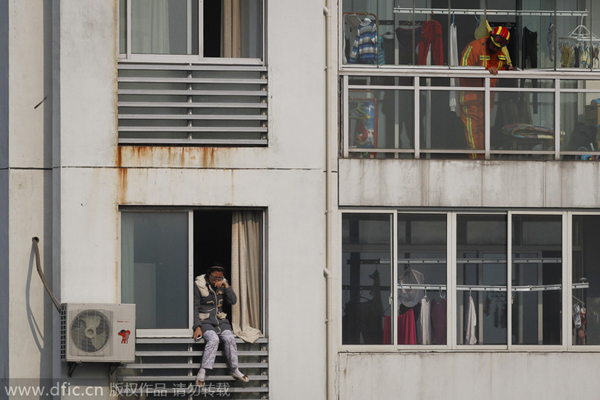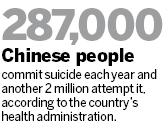Hospitals intervene to prevent suicides
By WANG HONGYI in Shanghai (China Daily) Updated: 2014-08-19 04:41Experts and volunteers providing psychological care for those at risk
|
 A woman attempting to commit suicide is pictured in this 2013 file photo in Shanghai, when a fireman, right, tries to rescue her. The woman is suspected to suffer depression. [photo/IC] |
Psychological aid and suicide intervention will be available in the emergency rooms of Shanghai hospitals.
Such services are part of a new social organization for suicide intervention, which will be set up next month ahead of World Suicide Prevention Day, observed on Sept 10 each year.

The organization, Shanghai Xinsheng Psychological Crisis Intervention Center, consists of more than 10 experts and a group of volunteers.
"Suicide can be prevented. Most suicide cases can be detected through some early signs, and nearly 90 percent of suicides can be prevented through comprehensive intervention," said psychological expert Shan Huaihai, who has been working in suicide intervention for more than 10 years.
"If a person suffers from a mental illness, his or her suicidal behavior is generally not sudden. The earlier the intervention, the higher the success rate for preventing suicide," Shan said on Monday.
The organization plans to work with hospital emergency rooms to provide early treatment for unsuccessful suicides.
"People who attempted suicide received timely physical treatment in the emergency room, but their psychological problems were still not solved," Shan said.
Shan said very few doctors have received training in clinical psychological assessment or treatment, so they cannot participate in the intervention when a suicide attempt happens in an emergency room.
Shan once worked with emergency rooms in eight Shanghai hospitals, providing intervention for 112 people who had attempted suicide. Among them, 95 people solved their psychological crises after psychological treatment and medication, and they didn't have suicidal behavior during the three-month follow-up visits, according to Shan.
About 287,000 Chinese people commit suicide each year, and another 2 million attempt it, according to the country's health administration.
In recent years, governments and social bodies have intensified their work in providing psychological aid and have opened suicide intervention hotlines.
Shanghai's first 24-hour suicide hotline was launched in 2012 by the nonprofit Life Education and Crisis Intervention Center. Unlike similar hotlines in the city, it offers late-night and early-morning services, usually the peak times for people to reach out.
During the first year of operations, more than 2,400 calls were received. Around 20 percent of the callers were in need of urgent "crisis intervention", according to the hotline's operator. So far, the 24-hour hotline service has expanded to more areas, such as Beijing and Shenzhen, as well as Henan and Jilin provinces.
wanghongyi@chinadaily.com.cn
- Govt encourages people to work 4.5 days a week
- Action to be taken as HIV cases among students rise
- Debate grows over reproductive rights
- Country's first bishop ordained in 3 years
- China builds Tibetan Buddhism academy in Chengdu
- Authorities require reporting of HIV infections at schools
- Typhoon Soudelor kills 14 in East China
- Police crack down on overseas gambling site
- Debate over death penalty for child traffickers goes on
- Beijing to tighten mail security for war anniversary







